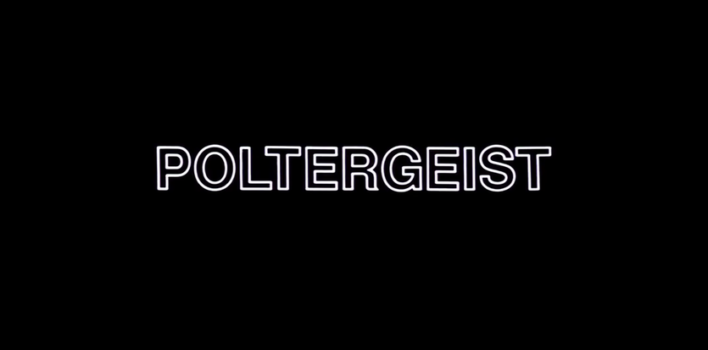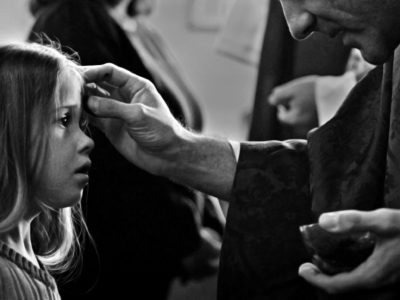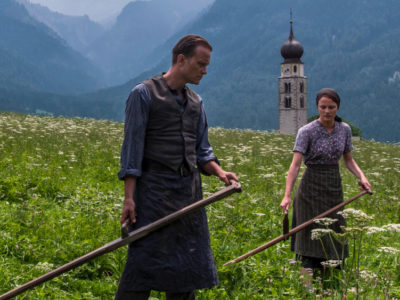Oh! The Horror… | of Plausibility Structures of Powers & Poltergeists
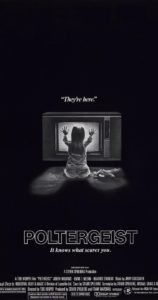 The line has distilled itself within American culture, taking its place among a pantheon of iconic phrases immediately recognizable even to those who have never seen its source: “They’re here.” Unlike “Play it again, Sam” (which Bogart never actually says) or “You’re gonna need a bigger boat” (in which the horror has given itself to the character’s understanding), Carol Anne Freeling’s statement in Poltergeist signals that the horror has arrived, yes, but is not yet recognizable as such. She intones the line with a childlike sense of curiosity and eager expectation, tragically unaware of what it actually portends.
The line has distilled itself within American culture, taking its place among a pantheon of iconic phrases immediately recognizable even to those who have never seen its source: “They’re here.” Unlike “Play it again, Sam” (which Bogart never actually says) or “You’re gonna need a bigger boat” (in which the horror has given itself to the character’s understanding), Carol Anne Freeling’s statement in Poltergeist signals that the horror has arrived, yes, but is not yet recognizable as such. She intones the line with a childlike sense of curiosity and eager expectation, tragically unaware of what it actually portends.
Is Poltergeist really a tragedy, though? Yes, but not in the colloquial sense of something bad befalling the protagonist. Rather, in the classical sense, Poltergeist is a tragedy because it depicts the consequences of human hubris and in it the audience participates in the catharsis of symbolically surviving those consequences. But there is no Oedipus or Agamemnon or Lear in Poltergeist; instead, there is the reified Man of late capitalist America. The tragic protagonist is always an individual representing the collective from which he comes, but in this instance the family around whom the story revolves serves as a personification of an entire social class and mode of reasoning. Sympathetic identification with characters and situations is part and parcel of storytelling, but Poltergeist accomplishes something more than this: we are the Freeling family. As we gaze through our television screens at Carol Anne gazing through her own static-filled set, we gain a double perspective. First, we situate ourselves within the life she shares with her family, a life familiar to millions of upwardly mobile Americans. But additionally, we acquire an optic that allows us to critically examine that life in a way we cannot from within. For beneath the surface of an otherwise straightforward haunted house story is a critique of the myopic pompousness of capitalism and the plausibility structures of our modern, Western inheritance. Poltergeist confronts us with powers that exists beyond the circumscribed limits of our socially constructed lifeworld and drives home that we are not the lords of this planet.
 “They’re here.” Carol Anne stresses the second word of that phrase, emphasizing the spatial location of the entities that have made contact with her. They were once somewhere else, she (and we) reason, but they are now here. Her assumption is wrong, however. It’s not that these beings have just arrived- it’s that they have only now openly manifested themselves. What we realize over the course of the film is that they are here, powers beyond our normal experience but with claims to this planet equal to or superior to our own. Surrounding our everyday rituals, invisible to us, are howling cacophonies of malevolent entities, beings which antedate our practices within and postures toward the world, beings to whom our ways of life are laughable in their weightlessness and pettiness. The assumption that they have been absent owes itself to one of the enlightened, industrialized West’s chief blind spots: the discounting of the supernatural and the demotion of non-human intelligences to irrelevance.
“They’re here.” Carol Anne stresses the second word of that phrase, emphasizing the spatial location of the entities that have made contact with her. They were once somewhere else, she (and we) reason, but they are now here. Her assumption is wrong, however. It’s not that these beings have just arrived- it’s that they have only now openly manifested themselves. What we realize over the course of the film is that they are here, powers beyond our normal experience but with claims to this planet equal to or superior to our own. Surrounding our everyday rituals, invisible to us, are howling cacophonies of malevolent entities, beings which antedate our practices within and postures toward the world, beings to whom our ways of life are laughable in their weightlessness and pettiness. The assumption that they have been absent owes itself to one of the enlightened, industrialized West’s chief blind spots: the discounting of the supernatural and the demotion of non-human intelligences to irrelevance.
The upheaval in epistemology initiated by Descartes and radicalized by Kant did more than change how we think we know what we know: it enshrined an understanding of what and why we think we know. The practical outcome of this new knowing radically altered the West’s conception of itself. No longer were humans creaturely custodians of the world as given; henceforth, the world was the arena in which man made himself. The shift was immense yet often unnoticeable from the ground. After all, it’s not that humans had never utilized the planet and its resources prior to the modern era. The construction of the social lifeworld is always built upon the world as given to us (note the plural) but ideally is responsive to and cooperates with the integrity of the given. Modernity’s self-characterization as “humanity coming of age”, however, by and large abandoned this responsibility to the world as given and reconfigured reality as so much raw material for self-realization. This depiction of selfhood and of man’s place in the universe tethered itself to an economic model that promised the necessary conditions for actualizing that potential in human beings.
You’re up to your eyeballs in it all day, every day: capitalism.
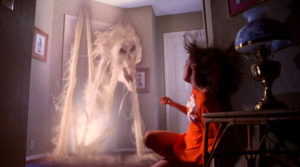 Under the aegis of a modern capitalist epistemology, a thing is real insofar as it yields itself in submission to human domination. The metric against which we measure the significance of anything is its malleability to the exploitative technologies of our agendas. This sieve of social knowing incorporates those things that are useful to the project of constructing the self and asserting its primacy but excludes enormous swathes of reality that remain invisible because of their seeming insignificance for our goals. There is an arrogance here that presumes a superiority to human projects and human reason over against the contours of the world as given. Put this starkly, it’s easy to deflect the indictment and insist, “That’s not me.” But it just might be that that’s exactly what Poltergeist is asserting. And it showcases how that arrogance is hopelessly frail in the face of the powers that have called the world home longer than we have.
Under the aegis of a modern capitalist epistemology, a thing is real insofar as it yields itself in submission to human domination. The metric against which we measure the significance of anything is its malleability to the exploitative technologies of our agendas. This sieve of social knowing incorporates those things that are useful to the project of constructing the self and asserting its primacy but excludes enormous swathes of reality that remain invisible because of their seeming insignificance for our goals. There is an arrogance here that presumes a superiority to human projects and human reason over against the contours of the world as given. Put this starkly, it’s easy to deflect the indictment and insist, “That’s not me.” But it just might be that that’s exactly what Poltergeist is asserting. And it showcases how that arrogance is hopelessly frail in the face of the powers that have called the world home longer than we have.
The carefully manicured neighborhoods of Cuesta Verde paper over the gross injustice of disregard for the order inherent in the creation, a disregard rooted in a pathological need for dominance. The exploitation inherent in the modern vision of man and the world manifests itself most heinously in the film’s twist- that the Freelings’ home and hundreds of others are located on cemetery grounds. Whatever the practical demands of housing development may have looked like, there are, at bottom, only two reasons to build directly upon burial sites: a calloused disregard for humanity and the lust for profit, both of which mutate into virtues under this paradigm. Carol Anne’s father, Steve, is responsible for forty-two percent of sales in Cuesta Verde, and planted his own home right in the heart of the dead. His idyllic conception of the American Dream has one foot in the grave. Our house in the middle of our street lies on the border between the living and the dead, and that border, we find, is porous.
 But that porousness extends yet further. The manufacturing of carbon copied subdivisions on top of corpses, after all, is emblematic of man’s stubborn denial of death, and there is nothing modern man loathes more than the inevitability of his own death. But the mass-produced homogeneity of affluence on display in the triumph of suburbia ironically mirrors the very intransigence of death. The sameness of suburban expansion finds its fruition in the sameness of rigor mortis and decomposition, in the anonymity of skeletal dissolution. The life lived with the aim of accumulating and amassing and solidifying wealth and security is a kind of death, invisible as such so long as we are biologically alive. There is a parallel between the suburbs and the grave at work in Poltergeist that calls our ambitions and hopes into question.
But that porousness extends yet further. The manufacturing of carbon copied subdivisions on top of corpses, after all, is emblematic of man’s stubborn denial of death, and there is nothing modern man loathes more than the inevitability of his own death. But the mass-produced homogeneity of affluence on display in the triumph of suburbia ironically mirrors the very intransigence of death. The sameness of suburban expansion finds its fruition in the sameness of rigor mortis and decomposition, in the anonymity of skeletal dissolution. The life lived with the aim of accumulating and amassing and solidifying wealth and security is a kind of death, invisible as such so long as we are biologically alive. There is a parallel between the suburbs and the grave at work in Poltergeist that calls our ambitions and hopes into question.
When Steve shrieks, “You left the bodies and only moved the headstones! Why? Why?” at his boss in the film’s grand finale, Teague can only stare dumbfounded back at him, as if to say: “Why wouldn’t I?” He cannot conceive of the world biting back: the very possibility is unimaginable, for what is the world but an inert ball of dirt ripe for development?
The dead have no place in this map of the world, have no duties owed to them; in fact, they are only acknowledged when they become hindrances to our projects of constructing ideal selves and homes. Even then there is no recognition of a shared humanity on our part: capitalism is more real to us than the dead. The being of those who have preceded us in life is excluded by the plausibility structures of our lifeworld. Those plausibility structures acclimate us to a very strange persuasion: that we belong to this place and other entities do not. Poltergeist unmasks the seemingly familiar world as bewilderingly, terrifyingly unfamiliar and asserts that despite our pretensions to the contrary we do not belong here. We can try to arbitrarily reshape the planet to suit our fickle desires but it will incorrigibly take its shape once more, swallowing up our efforts and laughing us to scorn.
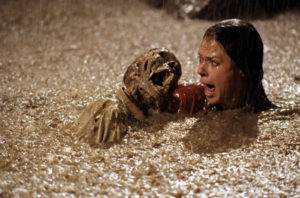
Our hopes and ambitions must originate somewhere other than the capitalist cartographers who shaped our era. We need to map them onto a different trajectory, one that passes through death and into genuine Life, a life that is not fundamentally oriented towards accumulation and actualization. The powers that invisibly shape our world will eat us alive should we immerse ourselves in that story. We must be immersed into a different story and belong to a different lord. For Poltergeist drives home that the world we yearn to belong to is not this one, and its lords are not kind to their subjects.


